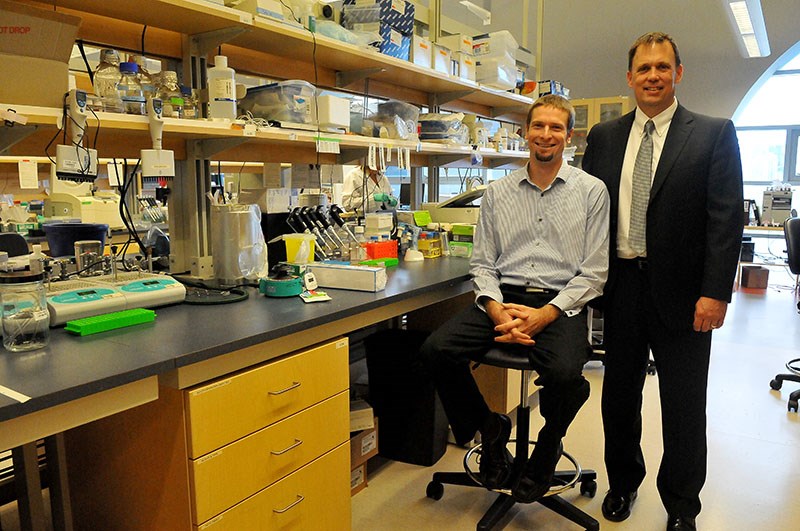Like most scientific discoveries, this one was serendipitous.
A grad student happened to add Vitamin C — a nutrient that humans can't make themselves, unlike other animals — to an enzyme called TET.
The reaction was instantaneous.
Martin Hirst, an assistant professor at UBC's department of microbiology and immunology, latched onto this find.
The North Vancouver resident studies why defective genes cause cells to behave abnormally and, soon, he was collaborating with other researchers to explore why Vitamin C "turned up" the activity in TET, which is typically "turned down" in cancer patients with acute myeloid leukaemia.
Could Vitamin C restore the balance to the epigenome in the blood cancer and become a therapeutic benefit to help those in need?
It's what Hirst is examining now in the lab at the BC Cancer Agency after winning a three-year, $450,000 grant co-sponsored by the Terry Fox Research Institute (TFRI).
A Pennsylvania native who heads epigenomics at the Cancer Agency, Martin was one of six "emerging" researchers in Canada to receive a Terry Fox New Investigator Award this year from the institute — the Terry Fox Foundation's research arm and the place where it invests about 86% of its annual contributions.
In the 2013-’14 fiscal year, according to its annual report, the institute and its partners spent nearly $30 million in cancer research at 65 cancer hospitals and research organizations across the country.
It's the legacy of the Port Coquitlam hero, and staff and researchers with the institute honour Fox for it every day.
Established seven years ago, the institute is entirely funded by the foundation, which has its national office at SFU — Fox's alma mater. It has a board of directors led by Dr. Victor Ling, who acts as the institute's president and scientific director, and includes Fox's youngest brother, Darrell, who was a key member of the Marathon of Hope team.
As well, TFRI has a scientific advisory committee that approves grants in the following categories:
• discovery research — TFRI's flagship New Frontiers program designed to support senior cancer researchers across Canada;
• translational (or applied) research — which moves the discoveries made in the clinic to the lab and, eventually, the patient;
• and new investigators research — for up-and-coming scientists developing independent careers in cancer research.
For the latter, the grant recipients must be mentored by a researcher in the discovery category.
For Hirst, it's Keith Humphries, who's exploring core pathogenic pathways in human leukaemia.
For Coquitlam's Ryan Morin — the other New Investigator Award winner from B.C. this year — his mentor is molecular biologist Randy Gascoyne.
The SFU scientist has his eyes on lymphoid cancer, in particular, how to draw a blood sample in cancer patients without a painful biopsy.
Biopsies, Morin said, are typically done where the tumour is the largest: the armpit, groin or neck; however, Morin's "liquid biopsy" would would less invasive and sample the DNA from the tumour as it's shed in the blood stream.
"PET and CT scans are not 100% accurate," Morin said, noting his method would see if the DNA is changing into a more aggressive form of cancer.
Hirst said cancer research has evolved significantly since Fox launched his historic Marathon of Hope in 1980 with the aim of building awareness and raising money to fight the disease that took his leg and would eventually take his life.
Survival rates have skyrocketed and discoveries — such as the Vitamin C reaction — are being made every year to help patients destroy the cancer and not everything else in its way, he said.
"We are trying to understand how much is enough because we don't want to cause more damage to the body," Hirst said.
"The Terry Fox Institute is really pushing cancer research forward," he added. "While we get limited funding from the government, it’s the public funds brought in through events like the Terry Fox Run that are helping us with this cutting-edge research."
[email protected]
@jwarrenTC
••••••
FOX RUN DETAILS
The Tri-Cities hosts four Terry Fox runs on Sept. 20 — including in the hero’s hometown of Port Coquitlam:
• Port Coquitlam: Hyde Creek recreation centre, 10 a.m. start;
• Port Moody: Rocky Point Park, 10 a.m. start;
• Coquitlam: Blue Mountain Park, 10 a.m. start;
• Anmore: Spirit Park, 11 a.m. start.



